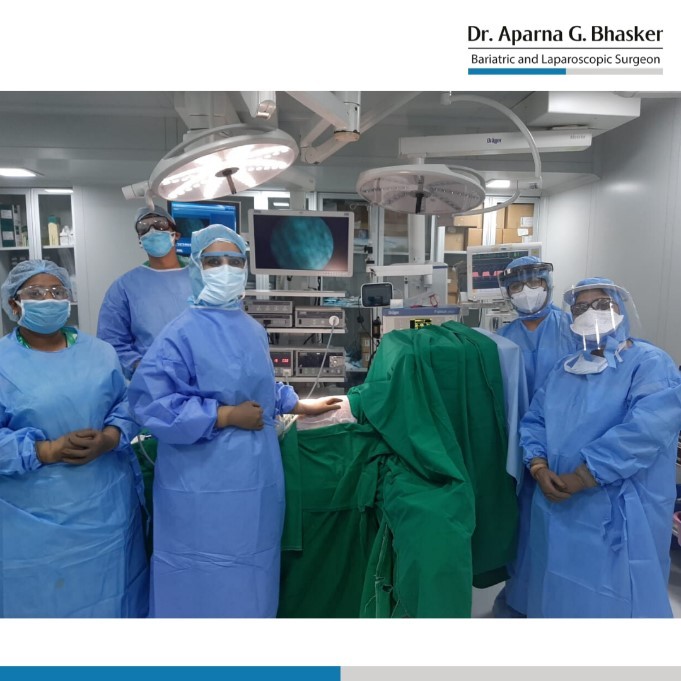A hernia is protrusion of an organ or tissue from an abnormal opening in the muscle or tissue that holds it in place. In this article we shall talk about external hernias that occur through a weak spot in the wall of the abdomen. The most common types of hernias are-
- Inguinal (in the groin)- 73%
- Femoral (below the groin in upper thigh)- 17%
- Umbilical (through the navel)- 8.5%
- Epigastric (above the navel, in the midline)
- Incisional (through the scars of any previous surgery)
- Rare types- lumbar, spigelian, obturator and gluteal
Hernia can be seen in all age-groups and all genders. In children congenital hernias are common. Inguinal hernias are seen more often in men. Umbilical and femoral hernias are seen more commonly in women.
The two main factors that are implicated in causing a hernia are weakness of abdominal muscles and increased pressure inside the abdomen which tends to force the internal contents out through the weakened area. Abdominal wall weakness may be congenital or could be a result of excessive fat, repeated pregnancies, or a surgical incision. On the other hand, increased abdominal pressure may be a result of long-standing cough, constipation, urinary straining, heavy exercise and so on.
Most patients present to the hospital with complains of a dragging and aching pain and/or a lump that may increase in size on exertion and reduce in size on resting or lying down. Sometimes, the hernia may get obstructed or strangulated and, in that case, it may present with vomiting, constipation and a swollen abdomen along with severe pain in abdomen. If you are experiencing any kind of pain or a lump in the abdominal or groin area it is advisable to visit a surgeon for a check-up. The diagnosis of hernia is usually by clinical examination. Investigations like ultrasonography or CT scan may sometimes be required. At the same time, it is also important to determine the cause of hernia.
The treatment of hernia is mainly surgical. Hernia cannot be treated by medicines alone. Hernia surgery usually involves reduction of hernial contents, repair of the defect and reinforcement of the defect with a mesh. Surgery can be performed either through open technique or by laparoscopy. The choice of technique (open/laparoscopic) depends upon the clinical characteristics of the hernia and the preference of the operating surgeon. While laparoscopic surgery is the preferred approach for most hernias nowadays, open hernia surgery may be required for very large, complex or recurrent hernias. Laparoscopy has many advantages over open surgery. As it causes very less trauma, it leads to less pain, early recovery, early discharge from the hospital and earlier return to work. Nowadays even complex hernia surgeries are being performed successfully through laparoscopic technique.
Hernia surgery is one of the commonest surgeries that is performed across the world. The benefits of getting a surgery done are many more than leaving the hernia untreated and subjecting oneself to the risk of complications like obstruction and strangulation. Striking video jackpots to high-energy online slots casinodulacleamy.com with immersive game play, exciting mobile games, and a range of slots to play. Also, as in the case of every disease, treatment is always easier and more effective when performed earlier rather than later. Hence, if you feel that you do have a bulge any where on your abdomen or in the region of the groin, do consult a surgeon immediately.
After the surgery it is important to take care and not overexert yourself for the first few months. Recurrence of hernia is a well-known complication and can happen more in people in whom the root cause of increased pressure in the abdomen has not been treated along with the hernia. Hence it is also important to avoid rigorous activity, treat constipation, treat the cough and so on.
However, most patients do well after surgery. The science of hernia repair has advanced a lot and many new interventions and techniques have come in recently. As surgeons treating hernia, it is our constant endeavor to take the best possible treatment options to our patients and work towards their well-being.
About Dr. Aparna Govil Bhasker

Read more about Dr. Aparna Govil Bhasker- https://www.bestbariatricsurgeon.org/dr-aparna-govil-bhasker/
Please write in to info@bestbariatricsurgeon.org or draparnagovil@gmail.com & Call/Text/WhatsApp: +919819566618 or +919930922761
Dr. Aparna’s website is- https://www.bestbariatricsurgeon.org
You can read her lovely blogs on- http://www.aparnagovilbhasker.com
Dr. Aparna Govil Bhasker is a visiting bariatric surgery or weight loss consultant at the following hospitals:
- Saifee Hospital, Charni Road, Mumbai
- Gleneagles Global Hospital, Parel, Mumbai
- Apollo Spectra Hospital, Tardeo and Chembur, Mumbai
- Namaha Hospital Kandivali, Mumbai
- Suchak Hospital, Malad, Mumbai
- Currae Specialty Hospital, Thane
- Surya Hospital, Santacruz West, Mumbai
- Hinduja Healthcare Surgical, Khar West, Mumbai
- Apollo Hospital, CBD Belapur, Navi Mumbai
- MGM Hospital, Vashi, Navi Mumbai
Social Media:
- Facebook- https://www.facebook.com/draparnagovilbhasker/
- Linked in- https://www.linkedin.com/in/dr-aparna-govil-bhasker-82836b34/
- Twitter- https://twitter.com/aparnabhasker
- Instagram- https://www.instagram.com/draparnagovilbhasker/?hl=en
- You tube- https://www.youtube.com/user/aparnagovil/videos?view_as=subscriber





